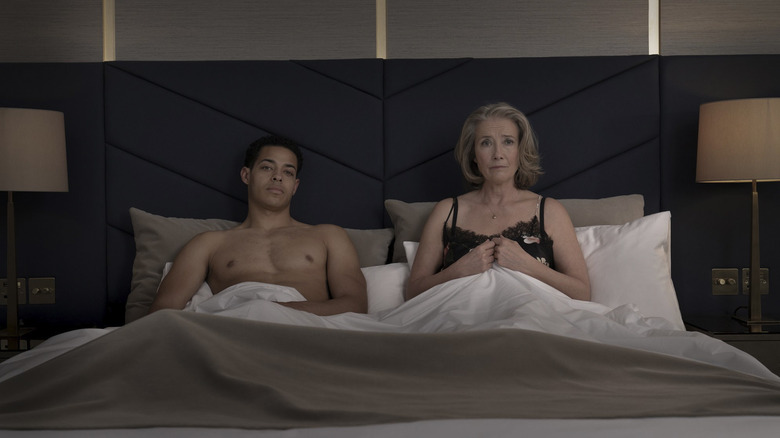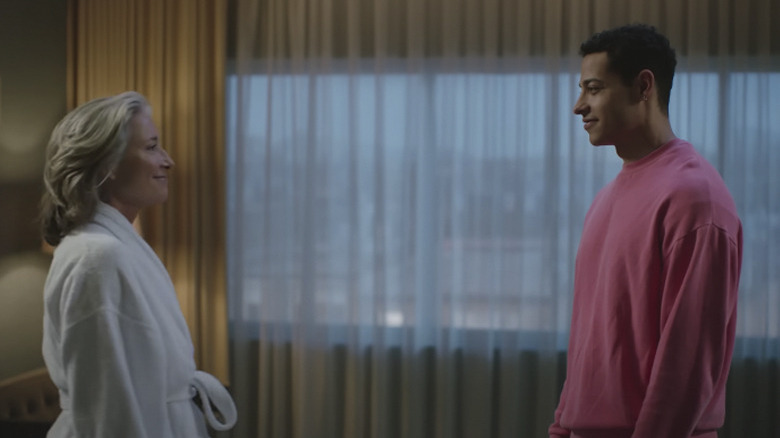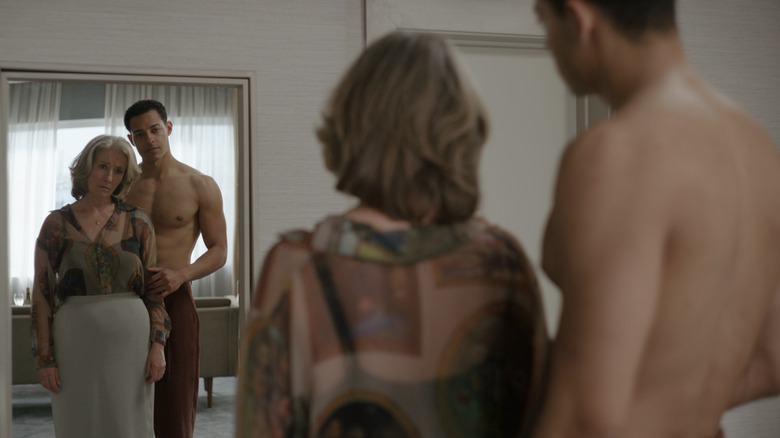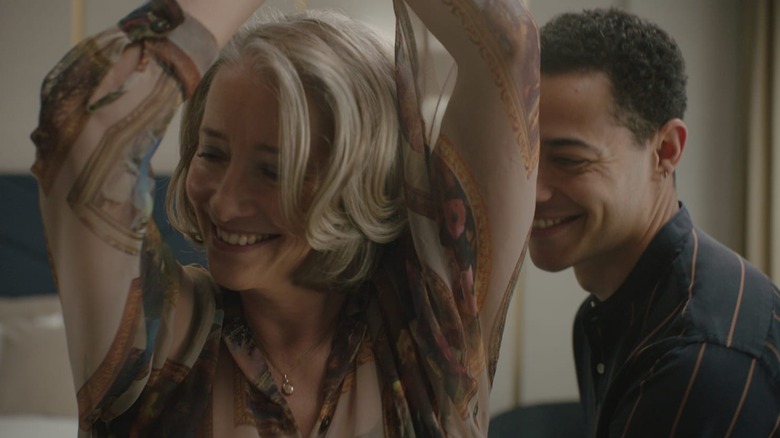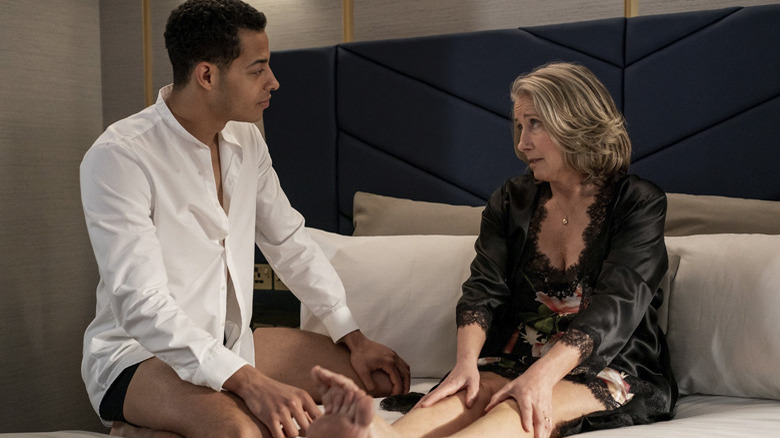Good Luck To You, Leo Grande Director Sophie Hyde On Directing Sex And Intimacy [Interview]
Australian director Sophie Hyde has quite an impressive resume of films highlighting the complicated ways sex, gender, and relationships shape our day-to-day lives. Her debut fiction film, "52 Tuesdays" is a stunning story about a teenage girl coming of age as one of her parents undergoes gender transition, which earned Hyde the Directing Award at Sundance the year of release. Her follow-up film, "Animals," stars Holliday Grainger and Alia Shawkat as two party girls forced to accept the complicated mess that is adult female friendship. Now, in her third narrative feature, already one of the best films of 2022, Hyde and writer Katy Brand have delivered a stunning character study of a widowed mother who seeks the company of a young, male sex worker to finally take control of the pleasure she was denied until this point in her life.
"Good Luck to You, Leo Grande" is a marvel to behold, with Emma Thompson starring in her most compelling and tender performance yet. Daryl McCormack ("Peaky Blinders," "The Wheel of Time") co-stars as the magnetic Leo Grande, and together the duo present an absolute masterclass in the exploration of sex and intimacy, pleasure and power dynamics, and what it takes to make a genuine connection with another person. We were fortunate enough to chat with Sophie Hyde to talk about the making of "Leo Grande," hearing her thoughts on the endless debate surrounding the "necessity of sex in cinema," and how she prepared to direct a film filled with moments of intimacy.
'Why are we so afraid of seeing sex represented on screen?'
There's been this, I guess I'll use the word "odd," puritanical push by people who claim sex scenes are unnecessary in film. I was curious what your feelings are on that mindset as somebody who just directed a lovely film where sex is integral to the plot.
Isn't it amazing that people say things like that? It's like, it's fine to take out a gun and shoot and blow things up, but sex? Too far. [sarcasm] I think sex is such a big part of life, and I don't mean sex as in, "We are talking and then suddenly every talking stops, and then we have sex, and then we go back." Sex is about human connection, and there's a myriad of ways that we enact that. It can be a conversation that continues into touch and comes back to that. So for me, if you're talking about intimacy, you're going to need some sex scenes. If you're talking about connection, you're going to need some sort of touch in there. Also, just selfishly, I love directing sex scenes. It's one of my favorite parts of making movies. So, I hope they stay. I hope we get to keep making them. Why are we so afraid of it, though? Why are we so afraid of seeing sex represented on screen? It's sort of like the nudity thing. We all have naked bodies under these clothes. Why are we so afraid of them?
On directing sex scenes
I'm right there with you. I feel like my brain melts out of my ears whenever I see a new "take" about it. I love that you mentioned that you enjoy directing sex scenes, because I think a lot of people don't understand what goes into directing a scene with so much intimacy. Would you be willing to share what your process is like to direct these moments?
I guess one of the things in the process is that you need enough in the script to begin with. So as a director working with a writer, you're asking and helping adapt the script so that there's space in there for the physical moments to happen. Then for me, my process is that I need to get on the same page with the actors really quickly. I like rehearsals, and the rehearsal isn't usually doing scene work, like dialogue. On this film there was a bit of that, though, because of the nature of it, but we have to get to a shared place. One of the great things that I'm trying to do in rehearsals is get them to feel connected to each other and to feel comfortable with each other, so that by the time they have to be intimate, that feels natural. In this case, we did so much work in the rehearsal room, and we explored our bodies, and we talked about them, and we talked about intimacy, and we shared stories, and we led up to a point where we actually, all three of us, got naked in the room.
That wasn't like, "Come on everybody, strip off." It was like, we did a task where I was saying, "Take off your rings and tell us something about that part of your body." So it was introducing our bodies to each other through what they do, not through what they look like. So it was like, "Oh, here's my foot. I love how I run every day." Or "Here's my elbow. I got a big scar on there, and that was a really important time in my life," or something. So that was getting them ready to be intimate, and then they rehearsed, and they were doing sex positions and everything. In fact, for Daryl and Emma, they went onto the set and were like, "Those last few days where we were naked without much dialogue? That was just bliss." They were suddenly like, "Oh, heavenly, we'll just lay around and do these things and not have to do 12 pages of dialogue or whatever."
On directing non-sexual intimacy
There are so many lovely moments scattered throughout the film, without even taking into consideration the sex. My favorite, I think, is when Leo invites Nancy to dance, and the dance he does is not a particularly sexy dance, but you can't help but just be so drawn in by him. I'm curious what the process was like in directing those intimate moments that were not sexual.
It's one of my favorite moments, actually. We wanted a dance scene in there, because Leo's doing so many things to try and get Nancy where she needs to be. He's offering so many things by that point, and one of them is, "Let's dance." We didn't want to just be like, "Put on the music and we're busting out free." Do you know? It needed to be more than that. For me, Daryl's such a surprising kind of actor, and in that moment, I just loved the kind of movement that he came to. I agree it's not trying to be sexual. It's not trying to say "I'm sexy." It's trying to relax her, but it is gorgeous. There's a joy in it that I'm very drawn to. We had a great movement director who came in who's an amazing dance maker, Theo Clinkard. He came in, and usually you have to get actors to relax, so he is doing some relaxation things, but those two were just like, "Yeah, whatever." They both love dancing.
In fact, it was just making sure that we pulled it back and made it feel like it wasn't choreographed, and that it came out of the experience of the actors. So they did this gorgeous process where I got to watch them exploring some ideas and testing some styles, and it was a very basic kind of sequence that grew, and it just felt excellent straight away. We hadn't shown anybody, and we went onto the set, and we showed the crew, which we would do each morning of a shoot — we would show the crew what we were going to do that day. The crew just were like, "Oh my gosh." They just had the real moment of loving it. We sent it back to the edit team in Australia and they had the same thing. They just said to us, "Oh, what's this?" It's not what you expected. Nancy's gorgeous inner world starts to be there. You start to see something about her, but Leo's the surprise where it's like, "Oh, this is not what I thought you were going to be like," and that excites me.
'You don't tick the boxes, you question the boxes'
I'm gay, and even I was so caught up in the moment I was like, "Why am I so attracted to this man right now? What is happening to me?"
[laughs]
So much of your work highlights the complex ways that social constructs like gender roles and age roles impact our existence, so I would love to hear in your own words why you tend to gravitate towards these stories and these characters?
That's really interesting. I guess I like to think about in the films that I make why we let ourselves be boxed into certain roles, and why we even take the box and put it around ourselves. I'm always looking for a chance to explore somebody trying to transform themselves, or find a freedom inside society, inside life, rather than a rejection. It's that binary thing, isn't it? It's not just rejection. It's, "How do I embrace what is possible, and what's there?" So I guess I'm looking for that. I realize sometimes all of my movies end the same way. They usually have the same ending with all different makers. [laughs] But it is something about challenging, very gently, the status quo of this is how we're "supposed" to be. This is how we're "supposed" to interact with each other. And questioning how we treat each other, and I guess how we treat ourselves, particularly in this film. Don't know why I'm interested in that, but I've always seen the world in a certain way. I come from a queer family, and I think of it as being very queer, actually. It's the idea that you can choose, that you have to think about what you want, sexually or otherwise, that things aren't just a given that you go through the steps of life in order to get. You don't tick the boxes, you question the boxes. I guess that's where it comes from for me.
"Good Luck to You, Leo Grande" will be available on Hulu on June 17, 2022.
